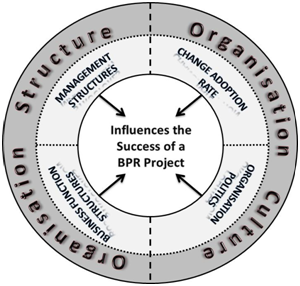A famous quote, “Installing a Rolls Royce engine in a Hyundai can make it inoperable,” (Russell Ackoff, 1999) as used to explain why improving parts of a system can be detrimental as opposed to improving the entire system, could also be used to explain why you should consider improving Business Process Reengineering BPR project execution as part of an organisation in terms of how they operate and not just by focusing on the technical execution of a project in terms of the project lifecycle. In other words the “BPR Project System” is made up of the environment in which it is executed as well as the BPR project itself inclusive of its execution method, its team structure, its project objectives and execution deliverables.
As mentioned in my previous articles, projects are executed within an operating environment as established by the organisation in which the project is executed. This leads to the organisation influencing the outcome of a project be it positive or negative, therefore, in aiming to reduce failure of BPR projects by improving how we execute BPR projects. Consideration should be given to certain key principles that exist within an organisation as part of the entire “BPR Project System”
The key principles that I found to have a major influence on the execution of BPR projects within an organisation can be summarised as part of the Organisation Ring of Influence (ORoI) model, which I developed.
The ORoI is the output of 10 months field work observing the dynamics of BPR projects being executed within a dynamic organisation where a dominant matrix management structure existed. The following four factors were found to have a major influence on the outcome of the projects studied:
- The way the organisation management was structured
- The stability of the organisation functional and or operations structure
- The influence business politics played in project decision making
- The capability of an organisation to adopt the business change at an acceptable rate

Figure 1: Organisation Ring of Influence (OROI)
The model, as depicted by Figure 1: Organisation Ring of Influence (OROI), comprises of two hierarchy’s differentiating between the Organisation Structure, its associated factors and the Organisation Culture with its associated factors. The factors are briefly explained as part of the narratives below.
Organisation/Business Politics, an element of Organisation Culture, is defined as “The pursuit of individual agendas and self interest in an organisation without regard to their effect on the organisation’s efforts to achieve its goals” (1). From this definition it is easy to see how this behaviour, forming part of the organisation culture, can influence the outcome of a BPR project.
Change Adoption Rate, a further element of Organisation Culture, is not to be confused with Resistance to Change. The latter is concerned with the deliberate and conscious decision of impacted stakeholders not to readily accept any organisation change. Change Adoption Rate, which can be influenced by resistance to change, concerns the ability of an organisation in terms of period taken before any change is implemented and standardised within the organisation.
Business Function Structure, an element of Organisation Structure, influences the success of a BPR project due to the value chain process philosophy. Process value chains can start in the Product Design department and end in the Sales department which results in multiple process owners, contrasting process understanding and disparate continuous improvement projects (2). This phenomenon can result in reengineering parts of a single value chain through different teams and different executive sponsors, without understanding the impact to the holistic nature of the value chain itself (2). All parts of a process, if isolated and reengineered could result in the value chain being left worst off than it was before (2).
Organisation structure also determines Management structures, which is a tricky one to get to grips with as to why this would influence the success of a BPR project. During the case study it was observed that a Matrix type management structure can support a BPR project by having many senior stakeholders focused on a single goal whilst on the other hand it could also negatively impact a BPR project by having many senior stakeholders with different goals trying to influence the direction of the project. Matrix management also propounds many points of accountability and decision making, which was found to negatively impact the payments project.
To conclude the ORoI contains elements that are brought into the project simply as part of inheritance due the project being executed within the organisation. The ORoI elements are currently not being prioritised and considered as part of the execution of the BPR projects yet due to their influence I would recommend that they be considered when embarking on any BPR project.
1. Business Dictionary. Organizational-Politics.
2. Dr Russell Ackoff. Systems Based Improvement with Russell Ackoff. Systems Wiki.

















